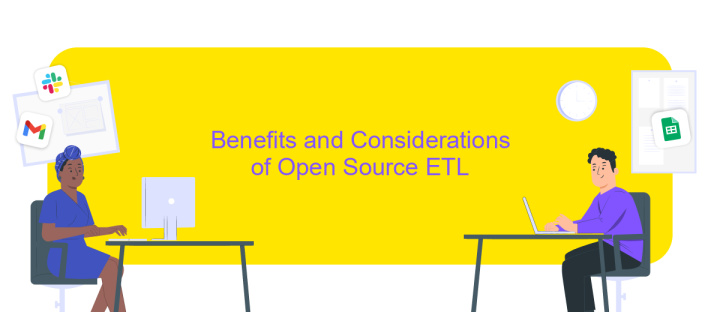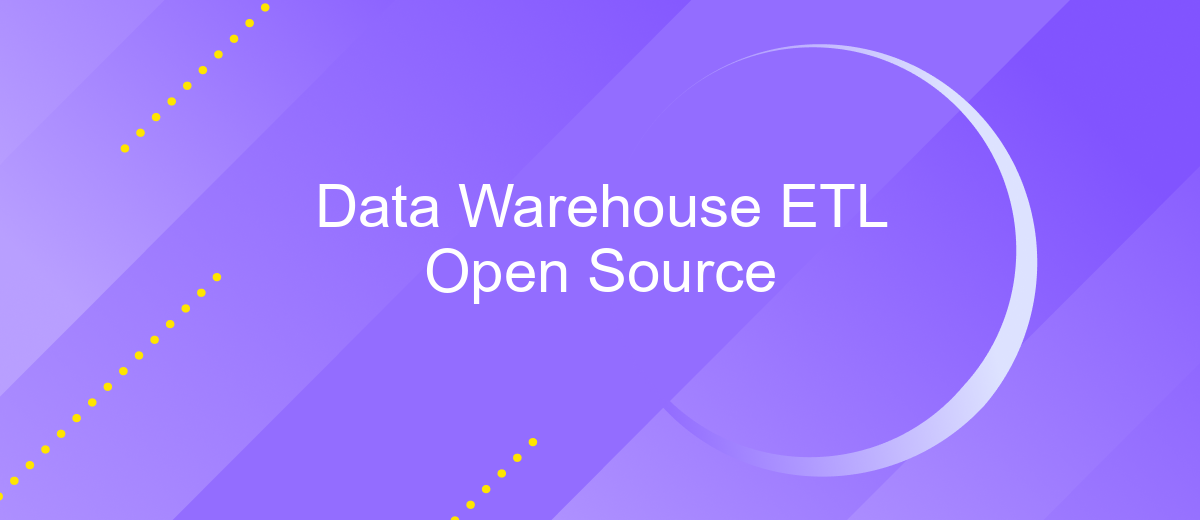Data Warehouse ETL Open Source
In today's data-driven world, efficient data management is crucial for business success. Data Warehouse ETL (Extract, Transform, Load) processes are fundamental for integrating and analyzing large volumes of data. Open source ETL tools offer cost-effective and flexible solutions for building robust data pipelines. This article explores the benefits and top options available for open source Data Warehouse ETL tools.
Introduction to Data Warehouse ETL
Data Warehouse ETL (Extract, Transform, Load) is a critical process in modern data management. It involves extracting data from various sources, transforming it into a suitable format, and loading it into a data warehouse for analysis and reporting. This process ensures that data is accurate, consistent, and accessible for decision-making.
- Extract: Collecting data from multiple sources such as databases, APIs, and flat files.
- Transform: Cleaning, filtering, and enriching the data to meet business requirements.
- Load: Importing the transformed data into the data warehouse.
Open-source ETL tools offer a cost-effective solution for managing these processes. They provide flexibility and community support, making them ideal for organizations of all sizes. Additionally, services like ApiX-Drive can streamline the integration process, enabling seamless data flow between various platforms and the data warehouse. By leveraging these tools and services, businesses can ensure efficient data management and gain valuable insights from their data.
Open Source ETL Tools for Data Warehouses

Open source ETL tools for data warehouses provide cost-effective and flexible solutions for data integration and transformation. These tools enable organizations to extract data from various sources, transform it into a suitable format, and load it into data warehouses for analysis. Popular open source ETL tools include Apache NiFi, Talend Open Studio, and Pentaho Data Integration. These tools offer a wide range of features such as data mapping, cleansing, and scheduling, which help in automating the ETL process and improving data quality.
Another valuable tool for setting up integrations is ApiX-Drive, which simplifies the process of connecting various applications and services without requiring extensive coding knowledge. ApiX-Drive allows users to automate data transfer between systems, ensuring that data is consistently updated and synchronized. This can be particularly useful when working with open source ETL tools, as it enhances the overall efficiency and reliability of data integration workflows. By leveraging these tools, organizations can build robust data warehouses that support informed decision-making and business intelligence initiatives.
Benefits and Considerations of Open Source ETL

Open source ETL tools provide numerous advantages for organizations looking to manage and transform their data. These tools offer cost savings, as they are typically free to use, and they allow for greater flexibility and customization compared to proprietary solutions. Additionally, the open source community provides a wealth of shared knowledge and continuous improvements, ensuring that the tools remain up-to-date and effective.
- Cost Efficiency: Open source ETL tools eliminate licensing fees, reducing overall costs.
- Flexibility: Users can customize the tools to fit their specific needs.
- Community Support: A strong community offers support and regular updates.
- Integration Capabilities: Tools like ApiX-Drive facilitate seamless integration with various data sources.
However, there are also considerations to keep in mind. Implementing open source ETL solutions may require a higher level of technical expertise and resources for customization and maintenance. Additionally, while community support is valuable, it may not always be as reliable as professional customer support. Organizations should weigh these factors carefully to determine if open source ETL tools are the best fit for their data management needs.
Implementing an Open Source ETL Pipeline

Implementing an open source ETL pipeline can significantly enhance data management capabilities while reducing costs. The process involves extracting data from various sources, transforming it into a suitable format, and loading it into a data warehouse for analysis. Open source tools provide flexibility and customization options, making them ideal for diverse business needs.
To get started, you need to choose the right ETL tool that aligns with your requirements. Popular open source ETL tools include Apache NiFi, Talend Open Studio, and Pentaho Data Integration. These tools offer robust features for data extraction, transformation, and loading, ensuring seamless data flow.
- Apache NiFi: Known for its user-friendly interface and real-time data processing capabilities.
- Talend Open Studio: Offers a comprehensive suite of data integration and transformation tools.
- Pentaho Data Integration: Provides extensive data transformation functions and scalability.
In addition to these tools, services like ApiX-Drive can further streamline the integration process by automating data transfers between various applications and databases. This ensures that your ETL pipeline remains efficient and up-to-date, allowing you to focus on data analysis and decision-making.
Case Studies and Examples
One notable case study involves a mid-sized retail company that transitioned to an open-source ETL data warehouse solution to streamline its data processing. By leveraging tools like Apache Nifi for data ingestion and Apache Airflow for orchestration, the company was able to automate and optimize its ETL workflows. This shift resulted in a 30% reduction in operational costs and significantly improved data accuracy. The open-source nature of these tools allowed for customization and scalability, ensuring the solution could grow alongside the business.
Another example is a healthcare organization that utilized open-source ETL tools to integrate disparate data sources, including patient records and clinical trial data. By implementing ApiX-Drive, they were able to seamlessly connect various APIs and automate data flows between systems. This integration not only enhanced their data analytics capabilities but also ensured compliance with healthcare regulations. The result was a more efficient data management process, leading to better patient outcomes and more informed decision-making.
FAQ
What is a Data Warehouse ETL process?
What are some popular open-source ETL tools for Data Warehousing?
How can I automate and integrate different data sources into my Data Warehouse?
What are the benefits of using open-source ETL tools?
How do I ensure data quality during the ETL process?
Routine tasks take a lot of time from employees? Do they burn out, do not have enough working day for the main duties and important things? Do you understand that the only way out of this situation in modern realities is automation? Try Apix-Drive for free and make sure that the online connector in 5 minutes of setting up integration will remove a significant part of the routine from your life and free up time for you and your employees.

